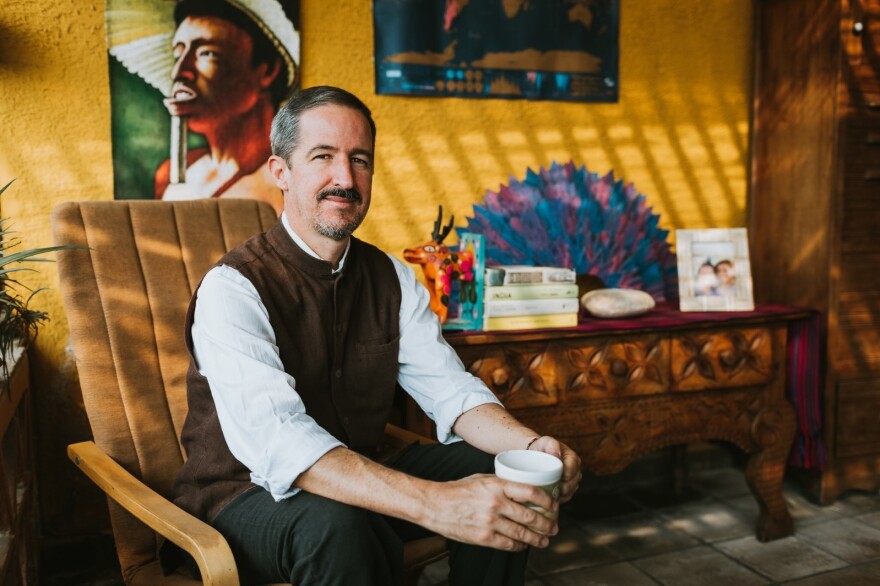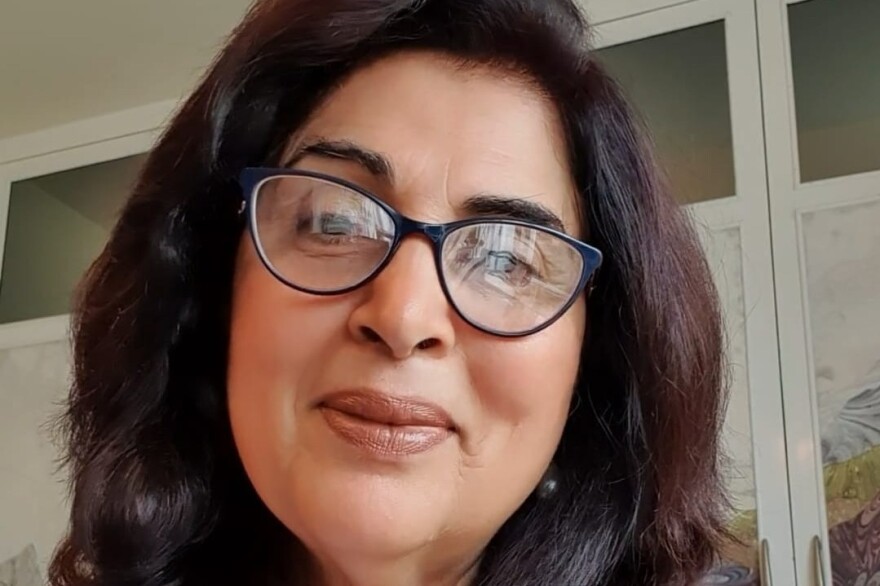Do the woes of the world get you down? Are daily headlines capsizing your ship? Does it seem like it's taking too long for the deluge of April showers to clear the way for all those promised and proverbial May flowers? (Unless of course you're in a part of the world still awaiting rainfall due to climate agitations.)
Well, we've got just the pick-me-up for you. Last week, the Skoll World Forum was bustling with innovators and entrepreneurs engaged in the work of "transformational social change" — that is, making the world a better place. We drew lessons in optimism from six individuals in attendance, who shared what gives them cause to be hopeful — why they find themselves smiling in spite of everything. The following answers have been edited for length and clarity.
Don't let the narrative change you. You must change the narrative
I don't believe that all of these problems are happening to us. I believe they're happening for us. Lonnie Holley is this wonderful artist who uses discarded material to create artwork. He says we shouldn't think of it as trash and garbage. Rather, it's something to work with ... something to make something new out of. It's this idea of narrative change. I like to think of it as "aesthetic force" because you can change people's minds and opinions through this work.
And isn't that a glorious thing? The possibility to shift and to pivot and to participate and to move ... which becomes ignited when times get hard.
You look at the civil rights movement. All these horrible things were happening, and it just propelled them forward. It made them want to move. Same thing with this racial reckoning. Something challenging and horrible had to happen to activate people and make them want to embrace dignity in a new way.
So when we look at how much we've survived and the shoulders that we stand on, what's not to be joyous about? — Ava Duvernay
Duvernay is a filmmaker and founder of ARRAY, an arts and social impact collective striving to change the world through storytelling.
Sleep, pray, love in safety

I love my family. I was brought up in a very close family. Of course we fight, but we also laugh together. We share everything — all the joys and the pains. And I know the pain I am feeling, my family will feel the same thing. We confide in each other and find comfort in that. When I want to be happy, my family is always there for me.
We are also a very religious family. We consider church our second home. All people want in church is peace. When we pray all together, I feel that I am reconnecting with God and that God can hear my prayer and everything that I'm concerned about because I open my heart completely.
Even when my whole family is overwhelmed, it is the priest and the church community who come to our rescue and comfort us as we pour our hearts out and cry. These are people who share my problems and I know they are on my side. I'm able to talk freely and not withhold anything.
So I can fall asleep in the presence of my family and my church — with these people who I love. I know that I am safe. — Mahali Hlasa
Hlasa is the Lesotho country director of Riders for Health, an organization that transports medical professionals and health services to isolated communities in need of vaccinations, medications and other treatments and tests
Tune into the genius of rural communities

I've been working in rural areas for the last ten years. And in the women, peasants and farmers I've met there, I've found another kind of genius. They help me understand that the future is possible.
I've seen how people in rural communities show a special sort of resilience and a lasting connection with nature and the universe that go back millennia.
In the north, we tend to be more similar in our approach. But amongst rural communities in the Global South, we see a beautiful diversity of opinions, understandings, ideas and knowledge that we need to recover to imagine a better future. These individuals can be tremendous leaders and mentors to all of us as we get back to our roots as humans in full connection with our planet. — Rodrigo Paris Rojas
Rodrigo Paris is CEO of Barefoot College International, a group that works in 93 countries to provide education, water, electricity and other assists for rural women. He is from Colombia and now lives in Guatemala.
Finding power in prayer

As for where I find optimism, I'll tell you — I start my day with prayer and I end my day with prayer. That's the biggest thing in my life. I'm a Roman Catholic and for me, that's where it all starts. Prayer is very personal. My prayer is between me and my God. But of course, I also pray with other people. In Kenya, a lot of our meetings actually start with a prayer.
We're a deeply spiritual people, whether we're Christian, Muslim, or Hindu. I think that is what continues to hold us and keep us together and keep the humanity part of us alive. — Michael Onyango
Onyango is the founder of 4gotten Bottom Millions, a Kenyan organization that shares information about jobs, job training and further education to connect people who don't have a source of income with new opportunities
Walk, chant, trust in goodness

When I see systems change so slowly, when I talk to girls and I find that not so much has changed in all these decades, of course I'm overwhelmed. Sometimes it really seems futile.
But I have this practice in the morning that I started doing during COVID when I was stuck at home and frightened. So after my walk in the morning, I come back, sit to face the sun, do a sun salutation, and I say some Vedic chants.
These invoke the goodness of the universe to protect and bless everything that exists — the sun, the moon, the fire, the wind, the Earth, living beings, the body, the soul and the self.
And along with that, I call out loud a set of affirmations. One is that I deeply love and accept myself.
Another one is that I trust the forces of goodness. That they're taking care of the universe. And I believe it. It restores my faith and restores a feeling of wellbeing.
I focus on and have faith in the goodness around. And I think eventually, it will prevail. — Urvashi Sahni
Sahni is founder and CEO of Study Hall Education Foundation, an inclusive organization that uses education to fight gender discrimination and the patriarchal mindset of young people in India.
Dance and draw strength from kids and nature

I find optimism in rural communities, in villages and slums. That's because despite the difficult environment around them, they're able to dance. At different times of year, they come together and celebrate. They bring so many smiles, so much joy. When I see that, I say, "I have more money than them, more education, more access, but they're way happier than me." So I find optimism in those ways of celebrating life and building community.
I've also found optimism among kids — Black, white, poor, rich — they play and they can enjoy life. They connect. It's only later that they learn about differences and start to behave differently. But when I see how they interact as children, it's all about playfulness. Even during war times or in refugee camps, I see kids finding ways to create joy amongst themselves.
And finally, in nature — how everything's about collaboration. So when I see the patterns of nature and the way that nature treats me since I was a kid, it's all about optimism. The negativity comes from humanity and the way that we behave to create scarcity — how we're afraid of and draw boundaries between one another.
But from certain communities, from children, from our elders and from nature, I feel optimistic that we can fix things. That we can create abundance by sharing. — Edgard Gouveia Jr.
Gouveia is co-founder of Livelab, a group based out of Brazil that uses games to mobilize large crowds to solve intractable problems.
Your turn: Share your personal tips on what you do to stay optimistic when gloom is looming
Finding a way to stay optimistic is something humans have explored for millennia. As the ancient Roman emperor Marcus Aurelius advised: "Dwell on the beauty of life. Watch the stars, and see yourself running with them." What do you do to keep yourself feeling positive in the face of pessimism? Email us at goatsandsoda@npr.org with the subject line "Optimism" and we may feature your strategy on NPR.org. Please include your name and location. Submissions close on Friday, April 28.
Copyright 2023 NPR. To see more, visit https://www.npr.org.




